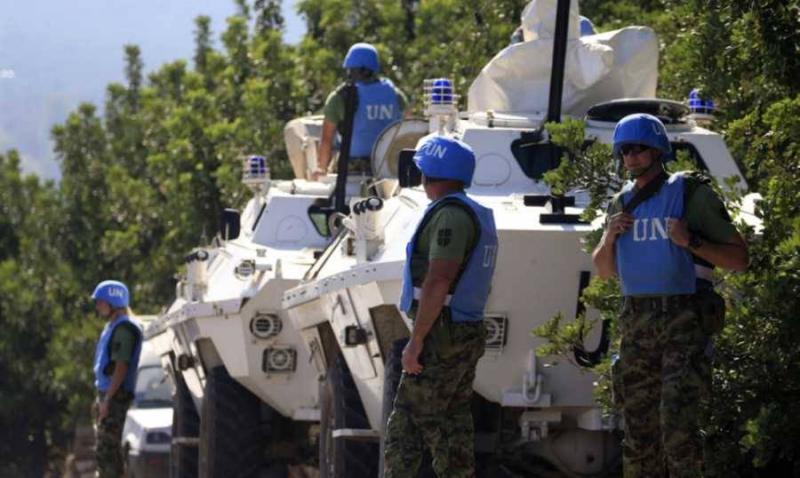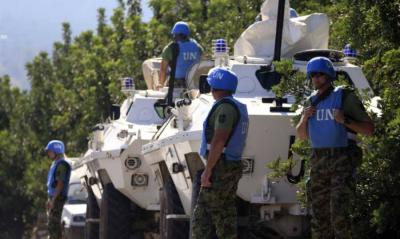While the Lebanese government was presenting its vision for establishing stability in southern Lebanon by reinforcing the role of the Lebanese army and the United Nations Interim Force in Lebanon (UNIFIL), a conflict arose between the army and UNIFIL during a joint patrol in the Kfarhamam area. According to information, the UNIFIL patrol insisted on entering a specific location classified as private property, which was outside its jurisdiction. This was rejected by the army, which opted to leave the area, while the UNIFIL patrol remained. After its departure, an Israeli drone struck the location, prompting the Lebanese army to notify the UNIFIL command to halt joint patrols, as reported by "Al-Jarida."
While UNIFIL spokesperson Andrea Tenenti confirmed that international forces continue their operations in coordination with Lebanese authorities, including joint patrols with the Lebanese armed forces, sources indicated that communications occurred between the army command and UNIFIL leadership to clarify the situation and remove any ambiguities. Sources assert that as a result of these communications, the issue was addressed, and joint patrols were reactivated, with assurances to UNIFIL to adhere to routes requested by the army.
This issue coincides with the time for UNIFIL's renewal, noting that France is interested in renewing its mandate for one year and has coordinated with Lebanon to prepare the draft and submit it to the United Nations Security Council for approval. Reports suggest that minor amendments have been made to the text, the first being a request from Western sources to enhance UNIFIL's role and powers and to condemn any assaults against it by Hezbollah or local residents. The second amendment pertains to a Lebanese demand for full and continuous coordination between UNIFIL and the Lebanese army, alongside condemning any Israeli assaults on the army. Based on the information, positive indicators exist regarding the approval of the one-year renewal, which is expected to happen automatically on the 31st.
Simultaneously, operations by Hezbollah along the southern border against Israel have escalated, expanding to areas near Tiberias, amid ongoing Israeli assessments that Hezbollah may retaliate for the assassination of its chief of staff, Fouad Shukr, before the upcoming negotiations on a ceasefire in the Palestinian Gaza Strip, called for by the United States, Egypt, and Qatar. In this context, UNIFIL forces are considering all possibilities, including the outbreak of a broader conflict lasting several days or entering a phase of active combat. This possibility has been under discussion between international forces’ leadership and New York to take necessary action, particularly following the evacuation of UNIFIL staff families outside Lebanon. Currently, they are looking into the measures UNIFIL personnel will take if military confrontations intensify, without dismissing an evacuation plan for military personnel if developments reach a point where it is impossible to control them and where there is no safety for the international forces to remain, recalling that international forces have not withdrawn from Lebanon during previous wars.
This comes as efforts continue with Hezbollah to avoid a response or delay it or to keep it confined, so that Israeli Prime Minister Benjamin Netanyahu does not resort to expanding the war afterward. Hezbollah has received messages from various parties urging a postponement of the response until after the 15th to avoid being accused of obstructing negotiations. However, Hezbollah believes that the massacre committed by Netanyahu on Saturday morning in Gaza is the clearest evidence of his rejection of all diplomatic solutions. The party anticipates continued escalation and, therefore, has not provided any answer regarding the timing of its response, affirming that the response is certain and non-negotiable.
In this context, Hezbollah also received warning messages from the Americans that Israel has a target bank ready to strike against Hezbollah should its retaliation be strong and result in Israeli casualties or damage to strategic sites or public facilities. Among the targets, it is reported that Israel may resort to expansive air operations within 24 hours to destroy numerous centers, sites, and weapon and missile storage using bunker buster bombs, which are heavy ordnance capable of destroying underground tunnels. Should Hezbollah target civilian areas, the option of targeting the southern suburb of Beirut, Hezbollah’s stronghold, would remain available, according to "Al-Jarida."




